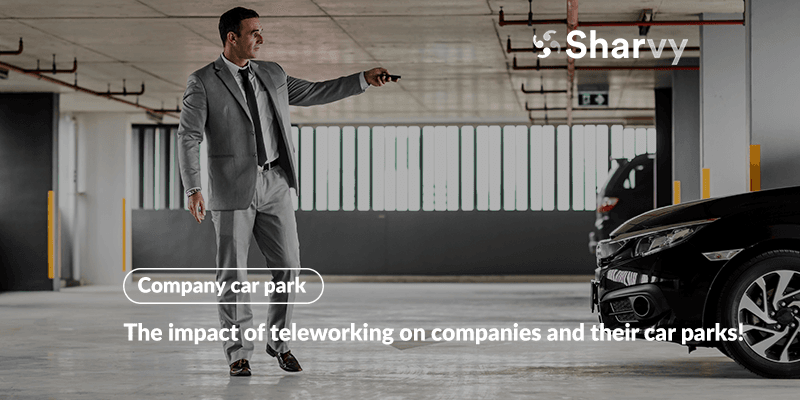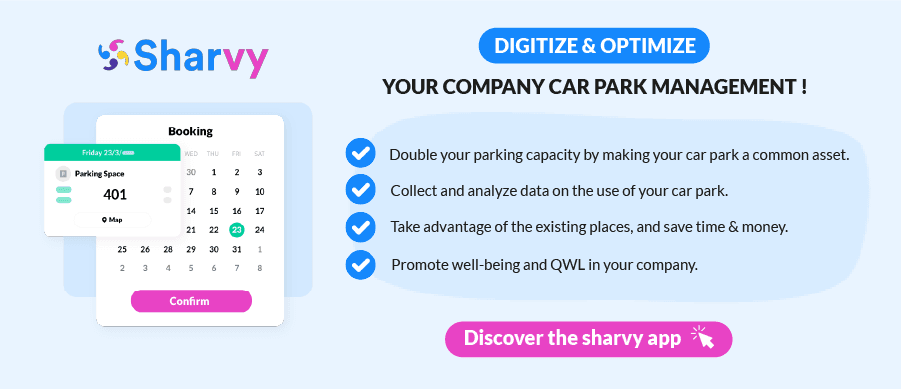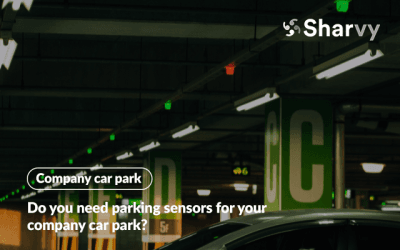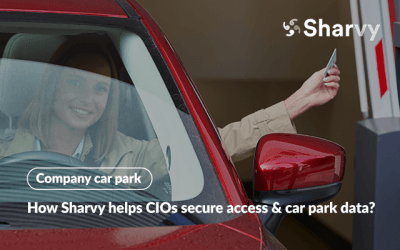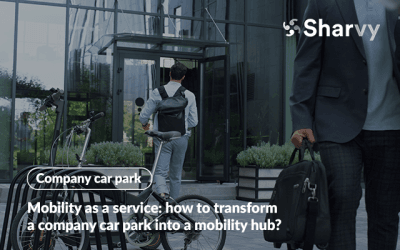In just a few years, teleworking has gone from being the exception to the norm. It has become a permanent fixture in companies, profoundly changing rhythms, presence and practices.
What began as a crisis response has become, for many, a new organisational model. Yet one paradox remains: companies continue to operate as if nothing had happened.
Offices are empty several days a week, but organisations remain static. Company car parks are one of the most visible symbols of this: allocated spaces always reserved for absent employees & rigid management inherited from another era.
We see this every day. In this article, we’d like to take a look at this change and find out how workplace parking can also adapt to the hybrid world we now live in.
The impact of teleworking on business: a new reality too often ignored?
1. A revolution in usage, inertia in practice.
Let’s be honest: teleworking has profoundly changed the way companies operate. Working hours are more flexible, offices are less crowded and videoconferencing is ubiquitous. But when it comes to organising logistics – buildings, flows and resources – the old ways of doing things continue to impose their logic.
Companies are still struggling to adapt fully to this change. Some of them have adopted the flex office: a model without a dedicated office, designed to limit unoccupied space. This change responds to a simple reality: workstations are far from being occupied full-time since the rise of teleworking.
But while this development marks a new awareness, it is often only a partial one. In practice, the overall organisation (parking, equipment, workflows) continues to follow the old reflexes. The flex office then becomes a solution disconnected from its environment, which loses effectiveness if it is not accompanied by a digital solution like Sharvy.
This contradiction between new habits and old practices generates inefficiencies that are costly and demotivating for your teams.
✔️ Our view: This discrepancy reflects a form of resistance to change that needs to be overcome as a matter of urgency, as it hampers your company’s overall performance. But you still need to be prepared to face up to the effects of teleworking, not as an interlude, but as a lasting change.
2. Company car parks: a mirror of this paradoxical situation?
Company car parks are a perfect illustration of the paradox in which many organisations find themselves: despite a significant drop in the number of people using their offices, parking spaces are often still allocated on a rigid, fixed basis.
As a result, employees, now present three days a week on average, are faced with two realities: a partially empty car park on certain days, particularly mid-week, and increasing pressure on the availability of spaces on busy days, such as Tuesday mornings.
This persistence in operating « as before » reflects a difficulty in fully integrating the impact of teleworking on the company.
✔️ Our view: Some managers fear that an overly flexible model will generate uncertainty and internal conflict. However, it is precisely by overcoming these fears and adopting innovative solutions (such as dynamic reservation and sharing of parking spaces) that the company will gain in fluidity, serenity and efficiency.
Inefficient parking in the age of teleworking: what are the consequences?
1. Costly under-use for your company.
Let’s look at an example: a company has 500 employees. It has 250 parking spaces, all allocated on a fixed basis to a proportion of the workforce. If we consider that these employees telework on average 2 days a week, this means that of the 250 spaces available, around 40% are not occupied each day.
That’s around a hundred empty spaces every day. At an annual cost of €1,000 per space (including maintenance, management & depreciation of the property), that’s an average of €100,000 a year up in smoke, with no benefit to the company or its employees. And that’s without counting the indirect costs associated with inefficient allocation, delays due to parking difficulties and the frustrations generated internally.
✔️ Our view: All these factors may seem anecdotal at first glance, but put together they degrade the quality of life at work, damage the employer’s image & affect collective performance over the long term.
2. Rigid management that hinders the expected flexibility.
One of the promises of teleworking is the freedom to organise one’s time, days and travel. And yet, this flexibility often stops… at the entrance to the car park.
By maintaining fixed and hierarchical allocation systems, companies are creating a form of contradiction: they are demanding agility from their teams, but are themselves stuck in unchanging reservation logics.
The result? An employee can telework for two days, come into the office for a third… and still be refused access to an empty seat, because it is « » reserved.
This discrepancy between the need for flexibility and rigid management is not insignificant. It sends out a signal: that of a company that says it is adapting, but in reality lets the little irritants of everyday life put the brakes on the collective momentum.
✔️ Our view: This situation reflects a lack of coherence between the rhetoric of modernity & practices. You can’t advocate flexibility, autonomy & trust while maintaining fixed operating rules that contradict these basic principles. This paradox is fuelling a form of managerial dissonance: employees are adapting, changing their habits, agreeing to share their desks in a flex office environment… but the company is refusing to review such simple (yet symbolic) arrangements as parking.
3. A poorer employee experience… often for the wrong reasons.
When every working day starts with a battle for parking spaace, it’s hard to cultivate serenity and commitment. And yet, in a context where companies are competing to attract & retain talent, the on-site experience can no longer be neglected (especially when it’s tarnished by hassles that can be avoided thanks to applications like Sharvy).
Sharvy, for example, enables employees who have a parking space to free up their space on days when they are teleworking or absent. These spaces then become available for reservation by other colleagues, according to simple & fair rules. The result: less waste & a fairer sense of sharing resources.
And it shows: those who come to the office find a place more easily, the incumbents keep their right of priority when they are present, and the company optimises without conflict or frustration.
Finally, this intelligent management sends out a positive signal: the company adapts to actual usage, trusts its teams and seeks concrete solutions to everyday irritants.
✔️ Our view: Continuing to underestimate the impact of « the little irritants » of everyday life is a frequent but avoidable mistake. By adopting flexible, collaborative solutions such as Sharvy, companies are showing that they are not content to pay lip service to quality of life in the workplace: they are taking action.
4. An ignored but avoidable environmental impact.
Teleworking has reduced the number of days employees travel to the office, yet car parks are still designed as if nothing had changed. This rigidity has an environmental cost that is all too often underestimated.
When spaces are reserved and unused several days a week, not only is urban space wasted, but there is also an incentive to maintain heavy, energy-intensive infrastructures. This paradox is all the more striking given that teleworking promises to reduce the carbon footprint associated with commuting.
✔️ Our view: If teleworking is to live up to all its ecological promises, its reality must be integrated into parking management. Adapting infrastructures and their uses to the new hybrid rhythms, encouraging sharing and flexible booking, is a concrete way of reducing the overall environmental impact. It’s also a way of showing that the company is consistent in its approach to innovation and responsibility, which is very important to today’s employees.
Adapting & anticipating: the key role of decision-makers in dealing with the impact of teleworking.
1. Observe practices rather than repeat habits.
The first instinct (which is natural, but a trap) is often to reproduce yesterday’s patterns. But behaviour has changed. Employees no longer work five days a week, workflows are becoming smoother & peaks are shifting.
A simple example: peak occupancy of offices and car parks is no longer on Mondays and Fridays, but on Tuesdays and Thursdays. The days of presence are no longer uniform, and teams move around in (often informal) shifts.
Adapting means first of all observing. This means collecting reliable data on the actual use of spaces, mobility patterns and actual usage. This enables us to make the right decisions.
2. Focus on flexibility rather than control.
Faced with changing ways of working, some companies try to maintain control through complex management systems, hierarchical approvals & rigid rules. But this approach, while often well-intentioned, ends up being more cumbersome than effective.
On the other hand, opting for flexibility, with simple tools, clear rules and the trust of employees, can (very often) make things run more smoothly without causing frustration.
For example, employees can declare their teleworking days in the company’s HRIS (Lucca, Workday, etc), and solutions like Sharvy can be connected to this software. In this way, the car parking space of an employee declared as teleworking is automatically released, and the reservation request is greyed out on the application to avoid any confusion.
In short, it’s a way of empowering employees by giving them the means to influence their day-to-day lives (by freeing up and reserving a parking space on their own, for example).
3. Share parking & flex office.
Teleworking has reshuffled the deck: offices are shared, rhythms are flexible and presence becomes intermittent. And yet, in many companies, the management tools have not kept pace.
They continue to manage the offices on one side and the car park on the other, often by hand (via Excel), using obsolete systems. The result: inefficiencies and unnecessary stress.
And yet, in a hybrid context, they are linked: an employee going to the office needs a workstation… but also a parking space. If they have neither, the whole experience falls apart.
Opting for a solution like Sharvy, which manages both parking spaces and office reservations in a single application, is a direct response to this new situation.
It’s simple, intuitive, and above all: it reflects a logic of use, not a flowchart.
4. Act now, so you don’t have to suffer tomorrow.
It’s no longer enough to note that habits are changing. Companies that wait for « to settle down » or « to go back to the way things were » run the risk of becoming disconnected from their own teams.
Updating your parking policy and rethinking how offices are used are not just « » projects. They are signals. Concrete demonstrations of an organisation’s ability to adapt, innovate and listen.
What’s more, if we want teleworking to remain a real lever (and not a factor of disorganisation), it’s time to adjust the tools, the practices and the mindset.
In conclusion
Company car parking has never really been seen as a strategic issue. As long as there was room (and complaints were kept quiet), it never bothered anyone.
But in a world of work profoundly changed by teleworking, hybrid mobility & flex office, what seemed anecdotal is, in fact, becoming a revelation.
Of what? About the ability of organisations to adapt, to listen to real practices, to make the employee experience more fluid… or, on the contrary, to remain stuck in outdated patterns.
The irony is that parking-related irritants are neither complex nor insoluble. They are simply ignored, relegated to the « column of minor annoyances », even though they are often the first to have an impact on the day’s mood.
And what if sometimes all it took was a simple tool, like Sharvy, to trigger this little gentle revolution? An application that liberates, reserves, shares – in short, that translates the much-vaunted agility into concrete action.
Got a question? Check out the FAQ!
How can we measure the actual use of office parking spaces?
There are several ways of measuring the actual use of parking spaces at the office. The simplest method « » involves manual counting at different times of the day, but this is limited and unreliable over the long term.
A more precise approach is based on installing sensors in each parking space. These sensors automatically detect whether the space is occupied and transmit the data in real time, providing continuous and reliable monitoring.
If your company uses a booking application like Sharvy, the booking data can also be used to analyse seat usage & identify under-used slots and seats.
This helps to better understand the patterns of office use, which is essential for anticipating future needs & rethinking infrastructure in line with new hybrid modes.
Can the release of parking spaces be automated according to teleworking days?
Yes, it is possible, but it depends on the tools used by the company. Some solutions, like Sharvy, can be connected to the company’s HRIS (Human Resources Information System). Thanks to this integration, the teleworking days entered in the HRIS can automatically free up the parking space so that other employees can reserve it. This prevents oversights and makes it much easier to manage parking spaces according to actual presence in the office.
Want to find out more? Check out our latest articles to stay up to date!
Do you need parking sensors for your company car park?
Are parking sensors a worthwhile investment or just a technological luxury for your company’s parking lot? Let’s take a closer look!
How Sharvy helps CIOs secure access & car park data?
Why are access security & corporate car park data a critical issue for CIOs? How can Sharvy help? Focus in this article!
Mobility as a service: how to transform a company car park into a mobility hub?
How can a company car park be transformed into a mobility hub? What role does Mobility as a service play in this evolution?
Subscribe to our newsletter!
PARKING & WORKPLACE MANAGEMENT SOLUTION
Car park management - Charging points monitoring - Desk booking - Booking by time slots
SUBSCRIBE TO THE NEWSLETTER
Receive the latest Parking & Workplace trends by email once a month.

